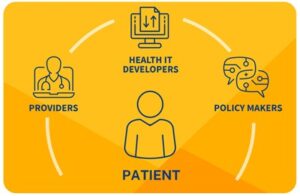The Impact of Healthcare Analytics & Big Data: What You Need to Know
Posted on: May 13, 2022
Botti & Morison Estate Planning Attorneys, Ltd.
Amazon, Apple, and Google are powerful companies hoping to take over healthcare analytics in the US, with Microsoft and Facebook plotting their entry into the market as well. Big data companies are already getting our healthcare data, like storing medical records in the Cloud for a fee or using “anonymized” patient forms to create new tools. Some products already cater directly to patients, such as wearable medical devices with monitoring capabilities through the internet.
So, Why Can Big Data Use My Info?
While there is a need to continue the modernization of the health care system, the complexity of modernization, entrenched financial interests, and privacy fears have posed challenges for tech companies. Lobbying efforts by Silicon Valley influenced the Department of Health and Human Services (HHS) as they defined a new rule known as the Cures Act. The law improves patient access to all electronic health information (EHI) and standardizes their formatting for ease of interoperability.
In today’s age of surveillance capitalism, patient records are no different from data mining other personal information. There is money to be made. Vast sums of money are a product of our health records. Some people estimate the healthcare industry will reach 11.9 trillion dollars by 2022, and electronic health care records (EHRs) represent a growing industry sector. Why else would these very cash-rich tech companies wade into such a risky field like healthcare analytics?
The digital side of the healthcare industry continues to expand and change. Such changes include new federal regulations that mandate hospitals to make changes and volatile health care costs. The big tech/data companies that deliver the best solutions will dominate healthcare analytics and become an even more intractable part of our lives. Tech skills like digital data management, data storage, and analysis translate well in any industry, especially in today’s modernizing healthcare industry.
Is your privacy protected?
The government outlines eight exceptions to the definition of information blocking in the Cures Act. The final rule allows for eight categories of reasonable and necessary activities. These activities do not constitute information blocking as long as certain conditions are met, referred to as “exceptions.”
In an enterprise-focused project, Project Nightingale, Google Health garnered some negative publicity regarding patient privacy. Problems arose when Google had access to non-anonymized patient data without the patients’ knowledge. Google then created tools that manage and analyze medical records for doctors and hospitals where some non-anonymized data had been used.
Amazon
Meanwhile, Amazon Web Services (AWS) enjoys a dominant position in the service-based cloud storage of health records, offering downloadable medical information databases for clients. To sidestep privacy responsibilities, an AWS spokesperson said the obligation to comply with patient privacy regulations and policy was the responsibility of customers that sell the medical datasets through AWS.
More recently, the joint health care venture Haven (Amazon, Berkshire Hathaway, and JPMorgan) sought to target innovations in primary care, insurance coverage, and prescription drug costs. Haven has shuttered its operations after three years into their business partnership. The business sector is so complex that, most recently, entrenched health care companies are beginning to shake off these tech disruptors and are making deals more traditionally. Tech companies are countering with more joint ventures with established health insurers like Cigna and others.
The continuation of personal, wearable medical devices also sparks many privacy concerns, including the latest Apple Watch. These devices can take ECGs, detect falls, and phone 911, for example. But the recorded data and the communication systems for transferring this data make it challenging to protect your privacy. On the other hand, in the future, your medical doctor may prescribe you an Apple Watch, and your insurance will pay for it. So that reality also exists.
Microsoft
Azure, Microsoft’s cloud division, is directly competing with Google and AWS in the cloud storage business for medical records. For some reason, Azure declines to comment on how patient data is used in its business plan or how it would protect patient privacy. Yikes…
Facebook (Meta)
Finally, Facebook, technically called Meta, already has a health care tool. It’s called Facebook Preventive Health. If you select opt-in, Facebook (Meta) will use your basic demographic information and recommend medical tests and treatments. The company says the tool does not use your health information or whether you use the tool in advertising.
The healthcare analytics and medical record-keeping systems are changing. Getting medical records proving your child is vaccinated or transferring documents to a new doctor’s office was a never ending disaster. Let’s hope the digitization and ease of accessing health care records come with modernized privacy laws prioritizing and protecting patients.
I hope you found this article helpful. Please contact us today at 877-585-1885 to schedule a free consultation to discuss your legal matters.
Thanks for reading.
Christopher E. Botti, Esq., Certified Specialist in Estate Planning, Trust and Probate Law









